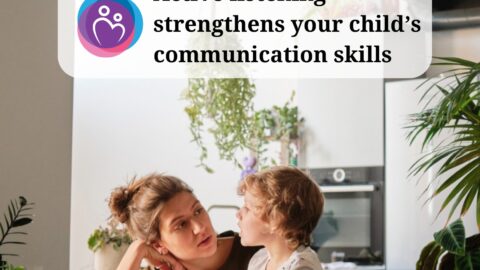 Children who feel safe to be honest about their whole range of thoughts and feelings tend to generally feel more at peace within themselves, and hence their world in general. When children can freely share that which bothers them through their daily ups and downs, they gain a lot of valuable experience in identifying, knowing and working through their emotions.
Children who feel safe to be honest about their whole range of thoughts and feelings tend to generally feel more at peace within themselves, and hence their world in general. When children can freely share that which bothers them through their daily ups and downs, they gain a lot of valuable experience in identifying, knowing and working through their emotions.
Am I encouraging my child to be negative?
Parents often fear that “entertaining” their child’s negative thoughts and feelings will encourage them to be a negative person who’s unable to value and appreciate their life and those around them. Yet the opposite is true. As children get their worries, disappointments and that which they’re annoyed about off their chest, it frees them up to feel clearer and hence to see a situation from a wider perspective that includes the thoughts, feelings and needs of others. Children who feel blocked in expressing their dissatisfaction can feel stuck in their difficult feelings, feel judged for feeling how they do and resentments can fester.
When parents tend to dismiss, minimize or prematurely give advice
when their child expresses dissatisfaction, worries or disappointment, this makes it very difficult for a child to feel that their thoughts and feelings are important. When a child’s feelings are regularly dismissed, they can become very confused about their feelings. They might think “I’m really worried about the exam but I shouldn’t worry”, “my sister really annoys me but I shouldn’t let her bother me”. In other words “I feel this way but my parent clearly thinks that I shouldn’t feel like this.” When this becomes a predominant pattern, it can create much inner conflict and a child can feel very mixed up and start to avoid feeling what they feel. But when children shut down their feelings, this generates a lot of stress and also tends to result in a shut down of many of the more enjoyable feelings of joy, excitement, love, empathy, appreciation and general enjoyment of life.
Active listening.
Indeed, active listening is a badly needed skill in all relationships. Adults resolve many difficult issues when listened to with compassion. As a counsellor over the years, I’ve witnessed with awe and admiration as clients have tackled and resolved anxieties, compulsions, inhibitions and phobias, lack of confidence, depression, anger issues, self-hatred, shame, addictions and more as they work through the layers of unresolved pain that were previously buried deep inside all their life. There is a simple transformative power when a person feels genuinely heard, accepted and understood as they share their very raw, sore and conflicted feelings.
Catching up on previously unmet needs or unresolved trauma.
When the listener can provide enough space and empathy, the person sharing gains the opportunity to very honestly explore their deeper feelings. There’s only so much we can figure out and work through our thinking, the deeper feelings often provide the deeper and more valuable insights and perspectives when explored with emotional support. This is as true for children as adults. It’s often the feelings that someone is the most scared of showing that provide the greatest insights and relief when aired in a safe space. Becoming aware of deeper feelings that were previously stuck allows movement and often a lot of release. When feelings are heard and understood by another, it allows the speaker to meet some of the needs that weren’t met at the time of the original events that created the hurt feelings.
When parents go through divorce or separation or other big changes.
People of all ages tend to have the need to express, the need to feel understood, the need for empathy, the need to have sore feelings validated, the need to share with another, to no longer feel that the story has been lost forever, the need to feel seen. Gaining enough quality listening and empathy is especially important when children go through difficult changes like their parent’s separating, big changes like changing schools or when they’re recovering from trauma. A person learns that they are allowed to feel what they feel and they are so much more than any one feeling or reaction to certain events.
You may also like to read: Helping children adapt to change.
Feeling it to heal it.
When intense feelings are shared and met with acceptance and understanding, it can greatly help someone to release feelings of shame. Shame that builds up can be very debilitating. We all need to share our stories, they are a big part of who we are and what has influenced us. Our wounds and our gifts are often two sides of the one coin. Having our wounds witnessed and cared for by another can bring much soothing, and open us up to again feeling strong, resilient and enthusiastic.
Sometimes when my daughter gets upset, especially if it’s in response to something I’ve done or not done, there’s an urge to reason with her or explain (i.e. defend) my position. I know that she needs me to connect and acknowledge her feelings, yet it can feel really hard to bring myself back to centre, to be there for her and let go of my need t help her understand more about the situation that I think would help her. If I respond with reasoning aimed at helping her see and value my good intentions before I’ve truly showed her that I hear and acknowledge her feelings (and yes there is often a place for giving more information to clear up misunderstandings), then I close down the space for her feelings and make it more difficult for her to move through the feelings and reach the place of gaining a broader perspective. If I fall into responding from a place of defending why I did or didn’t do whatever, invariably, she’ll remind me that she just needs to express her frustration or needs me to acknowledge her feelings, which helps me remember the importance of showing her that I hear and honour her feelings. Yet children who are younger, or haven’t yet gained clarity both about what they truly need (to be heard) and their right to ask for that, may shut down or become reactive, often to the parent’s confusion. For most of us parents who didn’t gain a lot of quality listening and empathy in children, changing these patterns is a big and slow process, so we need to be patient with ourselves.
They don’t need to blame, they just need to feel heard.
I love how free my children are to give me honest feedback about what they do and don’t like. I love how clearly lacking in inner conflict they are when they express frustration that’s resulted in some way from what I’ve done or said, or not done or not said. In fact, often if I go on to explain my intentions, my daughter or son will tell me that they’re not saying that I should or shouldn’t have anything, they just need to express their frustration.
“I just need to get my frustration out” my girl has always said with such clarity. Accepting and holding my child’s internal process is an expression of love and care for her that I know she appreciates greatly. Remembering that feeling heard is what usually works for me is often what keeps me focused on what they need.
So often parents interpret their child’s expression of dissatisfaction as blame towards the person they’re dissatisfied with and respond defensively. Parents have often been trained to be intolerant of negative expressions. And indeed they may be feeling and expressing a lot of blame, yet how important it is to remember that their need is much more likely to be around expressing and gaining validation of their feelings.
A parent can hold a boundary to any expression of upset that’s aggressive and hurtful, while also making it clear that they DO care about the feelings being expressed “honey I can’t let you call me names, but you can tell me all about how upset you feel”, and maybe even suggest what they CAN say “you can say “I’m SO angry at you mum!!!” and you can growl or stomp your feet or cry. Or you can problem solve together at a calm moment when the connection is strong to explore how they can get all their frustrations out without causing any harm.
Why do most parents struggle to cope with their children’s cries? Most parents really struggle to stay calm when their child expresses upset or distress. There’s often a lot more going on emotionally for the parent at these times than they’re consciously aware of. Yet becoming much more mindful of when and why we get triggered is a big and necessary step towards being able to stay calm and strong at times of upset in the family.
The freedom of not feeling ashamed of their feelings.
I like to think and truly hope that my children won’t have that awful guilt and shame that most people experience when they need to process issues from their childhood or talk with partner/friends about their dynamics with their mum/parents. I like to think they’ll have an internal image of me responding to their complaints with empathy and support. I hope they will always hear me saying “it’s good to get it all out”. I think it’s fair to say that most adults have an internal image of their parent’s perceived disapproval that they cringe to face when they dare to “complain” about their childhood. This can sadly really inhibit the process of reflecting back on how they have been affected by dynamics in their family of origin. This reflection is essential as a person changes and evolves, we need to re-evaluate the beliefs that we want to keep and which ones we want to change as we raise our own child.
Revisiting your childhood with the wisdom of your adult self.
Not all, but most counselling clients I’ve helped over the last twenty years have been at one place or another in the process of negotiating those feelings of guilt, shame, fear and disloyalty as they find the courage to revisit and re-evaluate how their relationship with their parent/s affected and imprinted on their relationship with themselves and others.
So the next time your child is giving you feedback that’s a little bit hard to swallow, try to hold that you’re giving them a HUGE gift of allowing, supporting and validating their feelings, their right to have “negative” feelings in close relationships and a right to explore, identify, put words to and express those feelings.
Behind all pain is the drive to be at peace.
We invariably want to feel at peace with family members and allowing resolution of difficult feelings (at least within ourselves) is an essential part of the process of keeping the channels of communication open, clear, authentic and free of a backlog of pent up resentments, fear and distrust.
You might also like:









good pointers. any thoughts on how to get this for yourself? it seems to me that only someone whose needs are met, can fully meet the needs of others
Hi there Rachel, yes I believe that we all have a lot of emotional needs that can be very hard to meet when a busy parent is giving so much to their child and keeping the family, house, food, laundry etc afloat. We all need time alone, we all need the opportunity to share with a close person who we feel safe with and be met with empathy rather than judgment.
I think most parents (if not all) struggle to one extent or another with getting their own needs met, especially in the first five or six years, but really it’s an ongoing challenge. Yet the more we value the importance of gaining support, rest, fun, self-healing and times to de-stress, the more likely we are to put the work into getting these needs met. I often think that parents (adults in general) tend to value and prioritize the maintainence of their home, their land, their cars, their appliances, clothes, food and just about all the ongoing physical needs way more than they value the emotional needs. This, I believe, is symptomatic of an invalidation of emotional needs in our society in general, a society of individuals who mostly didn’t have their deeper emotional needs met sufficiently when they were young. Although many adults know that they were loved, they didn’t gain satisfaction and development in their needs to feel truly listened to, to have their feelings tuned in to in a respectful way, to feel validated, to gain support and empathy at times of frustration, disappointment, nervousness and overwhelm, to name a few, their needs to give honest feedback and negotiate in matters that intimately affected them. The needs spoken to in this article.
It’s hard to be the generation whose turning the tide, giving so much of that which wasn’t received, yet that’s what it takes to evolve and heal. Meeting needs is a daily challenge, each of us is at a different point of satisfaction/frustration of needs met or not met on any one day/week/month. So I don’t see it so much that it’s only when someone has all their needs met can they meet their children’s needs. Most parents are meeting many needs for their child that aren’t being met for themselves, like listening to their upsets and complaints. Yet it’s wise to recognize that it’s just not sustainable to keep giving that which we don’t receive. It’s stressful and resentments build up. So I guess we each do our best each day, but I strongly believe in putting more energy into being more aware of, caring towards and validating of our own needs and this internal care tends to lead to different choices and actions that are more likely to meeting our needs than not.
The other day I bumped into a mum in the supermarket who came to me for parent coaching/counselling a few months ago. Just one appointment, but it was a deeply emotional and insightful session for her. She told me yesterday that after realizing how much she was holding inside all alone, she started to share more with her husband, which has led to receiving more support from him. She’s religious and said that she also began to “bring more to God” which has really helped. I think this little story, hopefully explains how the internal validation can lead to accessing more support. Make sense?
Genevieve
Beautiful sharing! I would also suggest an idea that we can get our support from Source/God in so many ways. I have been in a difficult situation where it “seems” that I have literally no support for myself (and I did have that for my older children versus my much younger and newer addition and see the difference). What I have come to notice is that it is how I interpret my support makes all the difference; in other words, when I believe that I am supported by the Universe/Source, I am! And when I doubt it, well, I don’t feel as supported! It has been wonderful to see that to get support, the Universe is really flexible in getting it to you. Simple measures of meditation, nature, walks, etc..works but the most important factor is faith/belief that what you need is there, asking Self to guide you to what you need. Hope this helps 🙂
[…] deeply. Until the tight restriction of his breath would ease and his tears would come. Or sometimes big loud complaints about how I’m always with the baby and it’s not […]
[…] and also through play and laughter. Without enough space to really share and feel heard with their complaints, apprehension or fears, a parent’s well-meaning advice can add to a child’s fears and […]